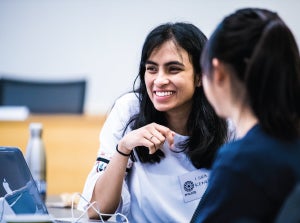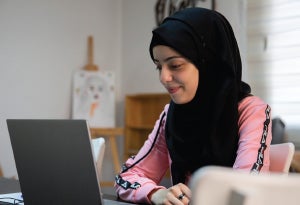 What happens when an exchange program designed to bring international participants together virtually finds itself in a moment when that’s the only way anyone is coming together? In April, the Stevens Initiative launched a three-track response to the coronavirus pandemic to help education and exchange leaders sustain learning for young people whose lives were being changed by social distancing.
What happens when an exchange program designed to bring international participants together virtually finds itself in a moment when that’s the only way anyone is coming together? In April, the Stevens Initiative launched a three-track response to the coronavirus pandemic to help education and exchange leaders sustain learning for young people whose lives were being changed by social distancing.
The Stevens Initiative builds global competence and career-readiness skills for young people by enhancing the field of virtual exchange. The program focuses its grantmaking on programs connecting youth in the United States with peers in the Middle East and North Africa, but it took on a special role in accommodating the new educational realities of the pandemic. It also offers live training, mentorship, and resources to help leaders in all regions provide young people with opportunities to continue global learning.
Grantees’ staff quickly adapted curricula to an unforgiving time frame, hoping to create the valued community atmosphere of in-person programs. Many participants joining from home struggled to access technology, faced competing responsibilities, and weathered unstable political and economic conditions in their communities. “During our time together, our team members faced the explosion in Beirut and a hurricane on the East Coast,” one participant says. “Yet we were able to coordinate and create a cohesive idea.”
 Grant proposals adapted in-person education and exchange programs to virtual ones, helped organizations adapt virtual exchanges to crisis conditions, and supported preparation for future exchanges. The program made 18 grants through a rolling review process in which they received 131 applications in under two months. The programs connected youth in the United States and Middle East and North Africa region for a range of activities, including collaborative art projects, peacebuilding training, and summer camps. All focused on giving youth an international experience.
Grant proposals adapted in-person education and exchange programs to virtual ones, helped organizations adapt virtual exchanges to crisis conditions, and supported preparation for future exchanges. The program made 18 grants through a rolling review process in which they received 131 applications in under two months. The programs connected youth in the United States and Middle East and North Africa region for a range of activities, including collaborative art projects, peacebuilding training, and summer camps. All focused on giving youth an international experience.
The pandemic-response grants helped 1,077 young people gain critical skills, friendships, and invaluable global experiences, and they trained 200 adults to implement programs in the future for thousands more. Stevens Initiative funding allowed the education group Engineering World Heath to replace a canceled inperson summer-abroad program with a five-week Virtual Innovation Exchange. Together, students in the US and Lebanon created 23 design projects to address the health care challenges posed by Covid-19. One team designed a low-cost, battery-powered oxygen concentrator to assist impoverished and rural areas during a global spike in demand. Despite being a first-time virtual program, the exchange was a positive experience for participants. “Getting the chance to coordinate with international colleagues and learn innovative ideas from them,” one participant says, “and share experiences and knowledge has certainly aided in my growth as a biomedical engineering student.”
The program also helped institutions prepare for future virtual exchanges. Faculty in the College of Education at Missouri State University and teacher trainers in Morocco, for example, developed new virtual exchange curricula. Now their teachers will be virtual exchange ambassadors in their own classrooms going forward.
Presentations, small group meetings, and one-on-one sessions created space for hundreds of professionals to quickly get involved in virtual exchange at a time of extraordinary momentum. The program also used the sessions to model communicating online, overcoming technology glitches, and demonstrating effective facilitation. Attendees say these sessions were very helpful as they rushed to start virtual exchange and as many shifted their strategies in the face of months of reduced in-person education and travel.
As the pandemic disrupted learning for students around the globe, the Stevens Initiative team also hosted town hall meetings with virtual exchange practitioners to coordinate a response and offer solutions. These meetings resulted in real-time intelligence to share with all attendees, including associations representing K–12 and postsecondary education. The town halls also sparked collaboration between the program and several associations, resulting in a resource guide for virtual exchange leaders and senior international officers at postsecondary institutions.
By acting quickly to meet the urgent need to launch online programs, the Stevens Initiative planted the seeds for virtual exchange to continue flourishing long after restrictions imposed by the pandemic end.